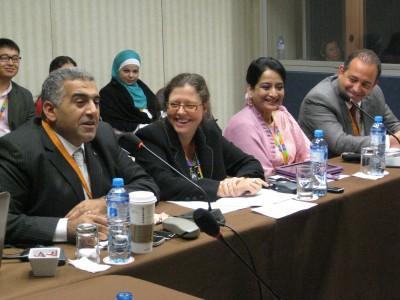
Participants at the workshop on economic and social inclusion, with moderator Jean Rogers (center). (Photo: Staff)
Social and economic inclusion have become priority themes in ensuring that democracy delivers for all. On October 16, CIPE organized a workshop on economic inclusion at the Lima Assembly of the World Movement for Democracy to explore possible routes to inclusion and the implications for giving a voice to excluded populations.
The first presenter, Selima Ahmad, founder of the Bangladesh Women Chamber of Commerce and Industry, said that in Bangladesh entrepreneurship has given women a voice. Women entrepreneurs have gained the ability to make decisions within the family, and men are even joining their wives’ businesses. The women’s chamber advocated successfully for women entrepreneurs to be able to get loans without collateral. Members of the chamber who have done well now create jobs and provide help to other micro entrepreneurs.
In Peru, entrepreneurship provides the only route to move up in life for many who lack formal education. Daniel Cordova, president of Instituto Invertir, described the EmprendeAhora program, which educates young Peruvians under age 25 on democratic and market concepts. This program engages youth by addressing their personal and professional interests. The key to the success of the program is giving them a concrete, entrepreneurial activity, such as starting a business or a non-governmental organization.
Osama Mourad from Egypt, CEO of Arab Finance, noted that the Arab people protested for the sake of their freedom and dignity. However, an economically empowered citizen is a citizen who cares about the future of his country. The revolution in Egypt made people feel empowered to determine their own future and to start businesses. Key issues for them are access to capital—which can be provided effectively through cooperative associations; reform of bankruptcy laws; and non-financial services.
Participants also discussed focusing on the most vulnerable segments of the population, finding synergies between cultural and institutional change, investing in high-quality education, the potential and limitations of microfinance, and equality of opportunity for indigenous and minority groups.
Some important recommendations emerged from the workshop:
- Providing access is a common priority: access to markets, access to finance, and access to information.
- We need to address individuals’ short-term interests, such as by providing microfinance or career opportunities, as well as the institutional framework for longer-term success, including property rights, bankruptcy laws, economic informality, and rule of law.
- Pro-poor policies and economic growth policies need to work together, not in opposition.
- Advocacy is important. This entails listening, working with others, and speaking from the heart. It should aim for systemic successes, not just individual successes.
- Programs for inclusion should be driven by demand in order to be sustainable. In particular they should be linked to markets and not dependent on government or donor services.
Thanks to Jean Rogers, CIPE Deputy Director for Programs, for moderating a great workshop! For further reading, see the resource guide on economic inclusion compiled by the NED’s Democracy Resource Center and CIPE.

